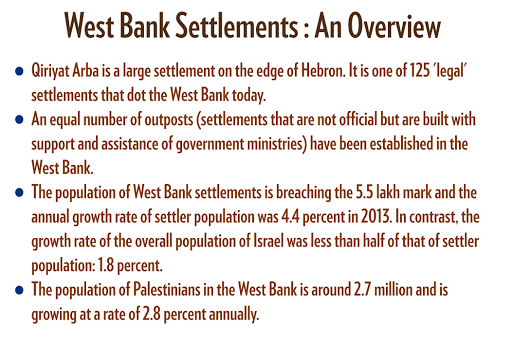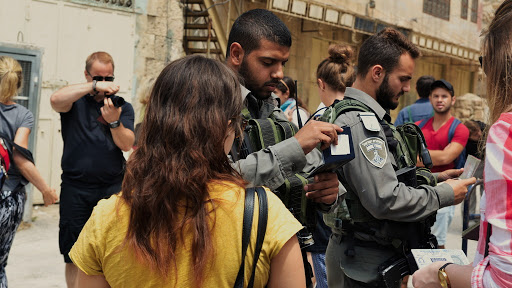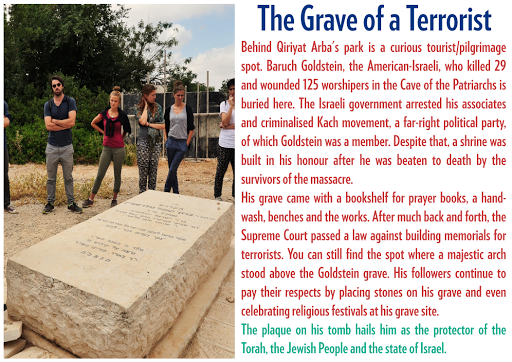Part one of this series: Hebron I
 Qiriyat Arba can be easily mistaken for a Tel Aviv residential neighbourhood. The architecture of the buildings, the pale yellow Jerusalem-stone walls, shopping centres, and the design and layout of the local park mimic Israeli sensibility. Even the popular Israeli junk food brands are available here. Inside the settlement bubble everything feels the same as Israel, with the one big difference that martial law is applicable here, not civil law.
Qiriyat Arba can be easily mistaken for a Tel Aviv residential neighbourhood. The architecture of the buildings, the pale yellow Jerusalem-stone walls, shopping centres, and the design and layout of the local park mimic Israeli sensibility. Even the popular Israeli junk food brands are available here. Inside the settlement bubble everything feels the same as Israel, with the one big difference that martial law is applicable here, not civil law.
Qiriyat Arba was established in 1968 by Moshe Levinger and his family on an abandoned army base. Since then, Qiriyat Arba has flourished and reached a population of about 8,000 in 2012. The early settlers, like Levinger, wished to stimulate Jewish settlement in the ancient Biblical heartland of Hebron; to some they were religious zealots. According to an ex-IDF combat soldier, following the peace treaty with Egypt, the drive to settle grew. “Giving up land for peace was not an acceptable option to many.”
Since then the demographics of Israeli settlers has changed by a few shades. Some now prefer to live in settlements as real estate is cheap in the settlements. Some settlers work in Jerusalem and some others have government jobs in H2 or nearby towns. “Most of them are not ultra-orthodox Jews. In fact, according to traditional Jews the Messiah will not come if a state is built. Settlers follow a brand of religious Zionism,” says the 30-year-old ex-soldier.
Because settlers live in a conflict zone, they find it very easy to get fire arm licenses. Sometimes these fire arms are issued to them by the army itself to protect the settlement! “Around 12 settlers per settlement get a weapon from the army. These chosen settlers even draw a monthly salary and have access to a military patrolling jeep.”
 |
| Settlers walking down Al-Shuhada Street |
“We are given strict orders to protect the settlers at any cost, even if it is the settler who is the perpetrator,” says an ex-soldier. If a settler is seen to be posing a threat, a soldier cannot neutralise the threat by attacking the settler, he has to wait for an opportune moment and disarm the miscreant without resorting at any violent means. “And while we wait to disarm him, he has done enough damage.” “I can’t shoot at Israeli civilians even if they threaten me. I just can’t do anything. We must take cover and wait.”
What else can the soldiers do in case of settler misbehaviour/violence, I ask. “First off, it is not an army problem. We inform our commanding officer, he informs his CO and eventually the police is informed.” The police in the West Bank are toothless against the settlers. “They do not take any action because they find it awkward to take action on settlers.” Why? “Because these police officers are mostly neighbours of settlers, they can’t afford to sour relationships in the community. How can the officer face the settler child’s father after arresting him?” Like it is all over the world, police officers in Hebron too do not take any adverse actions against settlers if they want to raise up in the ranks. Sometimes the settlers are able to intervene and protect their friends and children by listening in on the radio frequencies used by the army and police.
The rules that apply to settlers are much milder than those that apply to the Palestinians in this land. For example: If two minors, one settler another Palestinian, are caught committing a small crime – the settler kid can be detained for a maximum of 12 hours before he is presented before a judge whereas the Palestinian kid could be detained for at least four days before he sees a military judge. This is a great visual aid to understand the disparity. “After serving in Gaza for a few months I stopped asking why a Palestinian was being detained when I saw one blindfolded.”
“But that is not what it means. It should not happen to anyone ever again. Not that the Holocaust and Occupation are comparable.” Between the buffer zones, the leniency towards settlers, repeated attempts to set up outposts, the settlers are making the best of the mess here. “They are doing very well. Settlers want unhindered access to the Cave of the Patriarchs and they relentlessly set up outposts and rebuild outposts which are demolished by the army.”
 |
| Soldiers check passports and ID-cards of visitors at a check-post |
There are 18 check-posts that let Palestinians cross over between H1 and H2. “How do check-posts stop Palestinians from shooting settlers? Though the separation wall and check-posts are set up by sighting the security angle, it is only to control people.” A soldier narrates how his compatriots took charge of a school and set up grenade launchers in a classroom during the second Intifada. “At some point all this crosses a line we draw for ourselves. It seems immoral. Whom are are protecting?”
 |
| Army base in H2 |
True Story: A settler was hanging around inside an H2 military base on a Friday. As the day progressed and inched towards Shabbat, the settler instructed the soldiers to turn off the electricity supply to the main gate of the base. He did not want to break the rules of Shabbat when he went out to pray. The soldiers instead said that they could open the gates for him when he wanted to leave and that an army base can’t keep its gates open. The settler disregarded the concerns of the soldiers and just cut the wires that supplied power to the main gates.
The soldiers could of course do nothing.
As I am writing this post, an 18-month old baby was burned to death by Israeli settlers in a town close to Nablus in the West Bank. The settlers dropped bombs inside the house after breaking the windows of the house, setting the house on fire. For details, go here.
